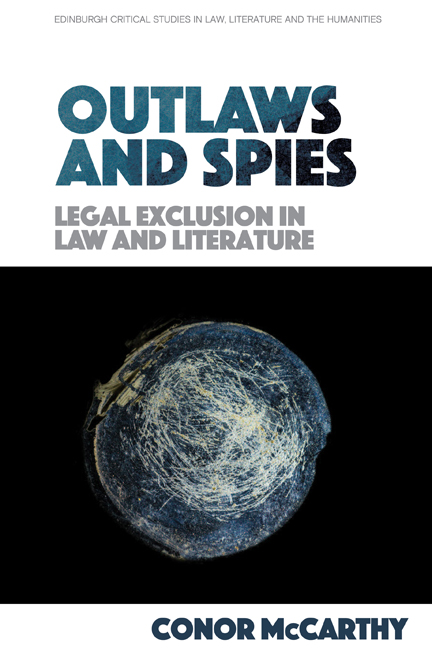Book contents
- Frontmatter
- Contents
- Acknowledgements
- Introduction
- 1 Outside the Law in the Middle Ages
- 2 Sovereign Outlaws: Shakespeare’s Second Tetralogy
- 3 The Endurance of Exclusion: Versions of Ned Kelly
- 4 ‘We’re Not Policemen’: Espionage and Law in John le Carré
- 5 ‘All Plots Tend to Move Deathward’: Plots and Consequences in Don DeLillo
- 6 Unanswered Questions: Ciaran Carson
- 7 Contesting the Virtual: William Gibson
- Conclusion
- Bibliography
- Index
1 - Outside the Law in the Middle Ages
Published online by Cambridge University Press: 08 October 2020
- Frontmatter
- Contents
- Acknowledgements
- Introduction
- 1 Outside the Law in the Middle Ages
- 2 Sovereign Outlaws: Shakespeare’s Second Tetralogy
- 3 The Endurance of Exclusion: Versions of Ned Kelly
- 4 ‘We’re Not Policemen’: Espionage and Law in John le Carré
- 5 ‘All Plots Tend to Move Deathward’: Plots and Consequences in Don DeLillo
- 6 Unanswered Questions: Ciaran Carson
- 7 Contesting the Virtual: William Gibson
- Conclusion
- Bibliography
- Index
Summary
The ‘Lawless Man’ in Medieval English Law
Outlawry is a phenomenon found in legal texts from across the medieval period. It is a commonplace amongst commentators that in part, at least, the resort to exclusion from law may be explained by the weakness of legal authority. ‘Outlawry is the last weapon of ancient law’, writes F. W. Maitland, ‘but one that it must often use’. However, ‘as the power of the state and the number of its weapons increase, outlawry loses some of its gravity’. Outlawry is reduced from being a substantive punishment to becoming mere process, a means of compelling the accused to attend trial. A sentence of outlawry, says Maurice Keen, ‘implied an admission of weakness on the part of the law itself’. ‘It revealed’, he suggests, ‘a failure on the part of the government; the sentence uncovered the inability of medieval society to curb its own unruly elements’. But when law and government become strong enough, outlawry fades away.
In this view, outlawry is a supplement to the formal legal system of a weak or emerging state, a remedy for its failings, and in fact we do find exclusion from law regularly described in early medieval texts in terms that may justify such a view: those who will not answer to the law, or submit to it, are placed outside it. The sixth-century Germanic Lex Salica describes how a man who refuses to come to court or obey a judgment, after being summoned on specified subsequent occasions, may be placed outside the king's protection (extra sermonem suum); his life and property then belong to the fisc until he has paid composition for his offence. The subsequent Edict of Chilperich describes how an ‘evil man’ who has committed an ‘evil deed’, and does not have the means to make composition but has fled to the forest, will be placed outside the king's protection (nostro sermone): whoever finds him can kill him without fear.
In the Early English laws, the earliest potential references to outlawry involve thieves caught in the act, who may be killed with impunity. This practice endures into the later medieval period, where a thief caught in the act may be killed, or, if captured, brought before a hastily convened court ‘and without being allowed to say one word in self-defence, he will be promptly hanged, beheaded, or precipitated from a cliff’.
- Type
- Chapter
- Information
- Outlaws and SpiesLegal Exclusion in Law and Literature, pp. 21 - 54Publisher: Edinburgh University PressPrint publication year: 2020



